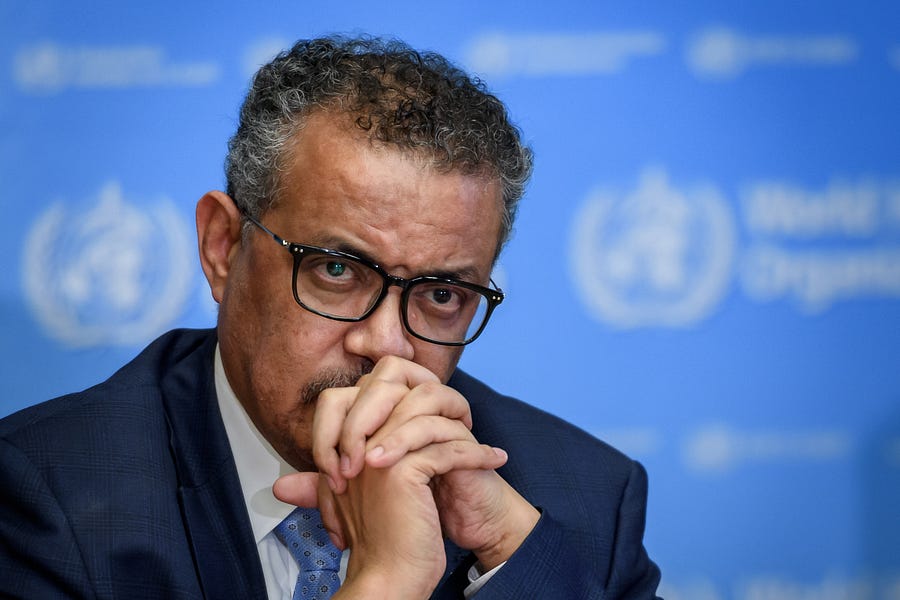For most people, having just failed spectacularly at one’s job is not the best moment to ask for a pay raise and more responsibility. Not so for Tedros Adhanom Ghebreyesus, the director-general of the World Health Organization.
In a letter co-signed by prominent global leaders, including the U.K.’s Boris Johnson, France’s Emmanuel Macron, and Germany’s Angela Merkel, Dr. Tedros is urging the world’s governments to draw “a new international treaty for pandemic preparedness and response,” which would be “rooted in the constitution of the World Health Organization” and would “foster an all-of-government and all-of-society approach, strengthening national, regional and global capacities and resilience to future pandemics.”
But the world already has a platform that is supposed to do exactly that: the WHO. The fact that the organization, under Tedros’ leadership, did not succeed in stopping the pandemic has little to do with its supposed lack of capacity or resources.
The failure has everything to do with the WHO’s politics, which led the organization to take information provided by the Chinese regime at face value, while ignoring the early warnings from Taiwan. Two weeks after Taiwanese authorities alerted the WHO of the possibility of human-to-human transmission on December 31, 2019, the WHO kept repeating the Chinese lie that there was no such indication. As late as February 24, 2020, the WHO claimed that the world was “not witnessing the uncontained global spread of this virus, and we are not witnessing large-scale severe disease or death.” At the time, there were documented cases in Italy, Iran, Japan, South Korea, and the United States, among others.
It took over a year and a WHO mission to Wuhan visibly thwarted by the Chinese regime’s secretiveness for Tedros to admit, in most subtle terms, that China has been less than fully transparent and cooperative in the efforts to identify the origins of the pandemic.
That is a welcome shift, to be sure—but it would be more compelling if it were accompanied by an admission of the WHO’s own mistakes, not limited to its deference to China. It took the organization until June 2020, for example, to update its guidance on masking, supposedly in an effort to ensure that masks were available to medical professionals. Had the world waited to use masks until then, many more lives would have been lost.
The present moment does not call for giving the WHO more power or resources. It calls for greater accountability of global public health bodies and officials—most prominently of Tedros himself—as well as rogue states such as China, which are currently treated as responsible stakeholders in the system of multilateral global institutions. More generally, however, the crisis calls into question a lot of the conventional wisdom about the need for “highly coordinated” global responses to global challenges.
As an example, take the development of COVID-19 vaccines, a shining success story of what was otherwise humankind’s annus horribilis. The success’s ingredients include a vibrant pharmaceutical industry, prior history of basic research, and a willingness of governments to commit real resources to research and development knowing that not all of the attempts to produce a vaccine will necessarily come to fruition. It was precisely a lack of coordination and the element of national prestige that led to the independent discovery of effective, high-quality vaccines on both sides of the Atlantic.
Simultaneously, vaccines offer a cautionary tale about international coordination. Fearful of vaccine nationalism, EU member states delegated procurement to the European Commission (EC). The result was a fiasco. Approaching the challenge as a ‘normal’ procurement problem, the EC moved slowly, pushed for low prices, failed to insist on strict delivery dates, and refused offers of extra doses—probably in a misplaced effort at frugality. The need for creative, though costly, efforts to boost production capacity (like the ones undertaken by the Biden administration) never crossed its mind.
We will never know whether a counterfactual in the form of the so-called Inclusive Vaccine Alliance, spearheaded by France, Germany, the Netherlands, and Italy, would have fared better if it had not handed over the vaccine agenda to the Commission. At a minimum, however, it is conceivable that national governments would have been far less frugal than the EC in their efforts to get shots in the arms of their own citizens quickly, unwittingly boosting manufacturing capacity and supply of vaccines for everyone, including citizens of poorer countries in the EU and beyond.
The letter’s analogy between the pandemic and the aftermath of WWII, when “political leaders came together to forge the multilateral system,” elides the fact that the putative “coming together” resulted almost exclusively from a U.S. effort to prevent the expansion of Soviet communism across the world. Today, the pandemic is more likely to come to an end thanks to a bourgeoning U.S.-led vaccine diplomacy aimed at curbing Chinese influence than from a multilateral kumbaya under the auspices of a new global treaty.
To be sure, there is nothing wrong about seeking to improve “alert systems, data-sharing, research, and local, regional and global production and distribution of medical and public health counter measures, such as vaccines, medicines, diagnostics and personal protective equipment.” Yet governments and other actors around the world will almost certainly draw the appropriate lessons from the pandemic themselves, in a bottom-up fashion—just like Southeast Asia learned its lessons from the SARS outbreak of 2002-2004.
Instead of making the case for new, more powerful global health institutions, the onus should be on Tedros and his ilk to demonstrate that the existing one can be made fit for its purpose, transparent, and accountable. Taking personal ownership of its failures in this pandemic would be a good first step.
Dalibor Rohac is a resident scholar at the American Enterprise Institute. Twitter: @DaliborRohac.





Please note that we at The Dispatch hold ourselves, our work, and our commenters to a higher standard than other places on the internet. We welcome comments that foster genuine debate or discussion—including comments critical of us or our work—but responses that include ad hominem attacks on fellow Dispatch members or are intended to stoke fear and anger may be moderated.
You are currently using a limited time guest pass and do not have access to commenting. Consider subscribing to join the conversation.
With your membership, you only have the ability to comment on The Morning Dispatch articles. Consider upgrading to join the conversation everywhere.